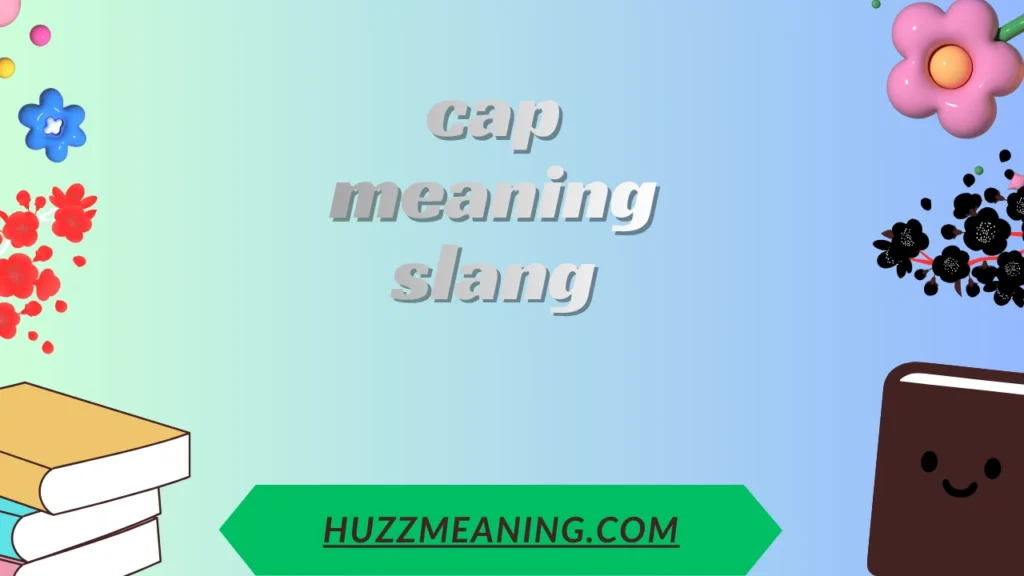Language evolves fast — and slang words evolve even faster. If you’ve been scrolling through TikTok, Twitter, or Snapchat and keep seeing someone say “no cap” or “that’s cap”, you might have wondered what it actually means. Don’t worry — you’re not alone!
In this article, we’ll unpack the true “cap meaning slang”, explore where it came from, what it means in different contexts, and how you can use it correctly in real conversations. Whether you’re new to internet slang or just want to understand Gen Z lingo better, this guide will make you sound fluent and confident.
What Does “Cap” Mean in Slang?
In slang, “cap” means a lie or false statement, while “no cap” means the truth or being honest.
So if someone says “That’s cap”, they’re calling out something as false or exaggerated. But if they say “No cap”, they’re emphasizing sincerity — like saying “I’m serious” or “I’m not lying.”
👉 Examples:
- “You said you can bench 300 pounds? That’s cap.” 💪😂
- “This pizza is the best I’ve ever had, no cap!” 🍕🔥
This simple word has become one of the most popular slang terms in digital culture, especially across social media platforms like TikTok, Twitter (X), and Instagram.
The Origin of “Cap” in Slang
The slang term “cap” actually has deep roots in African American Vernacular English (AAVE). It’s been around since the early 1900s and was used to mean “exaggerate” or “lie.”
- In older hip-hop culture, “capping” meant showing off or bragging falsely.
- The phrase evolved as rap culture spread globally, especially through artists like Young Thug, Future, and Lil Baby, who popularized “no cap” in their songs.
🎵 Cultural Note:
The phrase “No Cap” gained massive attention after rappers Young Thug and Future released their 2017 hit “No Cap.” Since then, it has been adopted widely in everyday speech and online slang.
“Cap” vs “No Cap” — What’s the Difference?
| Term | Meaning | Example |
|---|---|---|
| Cap | Lie, exaggeration, or something false | “You won the lottery? That’s cap!” 💸 |
| No Cap | Truthful, honest, not lying | “I’m your biggest fan, no cap!” 🎵 |
In short:
- “Cap” = lie 😏
- “No cap” = truth ✅
This contrast is what makes the slang fun and expressive — it’s short, punchy, and works in almost any casual conversation.
How to Use “Cap” Correctly in Conversation
Using slang naturally takes practice, but here’s a quick breakdown to make sure you get it right:
- When you think someone’s lying:
👉 “Bro, that’s cap. You didn’t meet Drake.” - When you want to confirm you’re being honest:
👉 “That movie was fire, no cap!” - When you’re playfully teasing a friend:
👉 “You’re the best cook? Big cap, bro.” 🍳😂
The Emotional Tone Behind “Cap” 😍✨
Unlike harsh words for lying, “cap” carries a playful, teasing, and humorous tone. It’s rarely used in anger — it’s more about calling out exaggeration or showing disbelief in a fun way.
For example:
- “You wake up early every day? Cap!” — sounds lighthearted, not rude.
- “I’m so good at math, no cap.” — adds personality to your sentence.
The emotional appeal of this word lies in how flexible and friendly it sounds in digital conversations.
Why “Cap” Became So Popular Online 🔥
Slang spreads fast — and “cap” went viral because it’s easy to type, sounds cool, and fits into short-form content culture.
Platforms like TikTok and Twitter amplified its reach, turning it into a linguistic badge of authenticity. People began using “no cap” as a digital signature of honesty — like saying “I’m keeping it real.”
💬 Example:
TikTok comment: “She killed that dance, no cap!”
Translation: “She did amazing — for real!”
Other Popular Variations and Related Phrases
Here are a few related slang terms you might see alongside “cap”:
- “Big cap” — A major lie or huge exaggeration.
👉 “He said he’s friends with the president. Big cap!” - “Stop the cap” — A demand to stop lying.
👉 “You don’t have a Bugatti, stop the cap!” - “Capping” — The act of lying.
👉 “He’s capping again about his job.” - “No kizzy” — Another slang meaning “no cap” or “no lie.”
These variations add flavor and humor to online conversations, helping people express truth or disbelief in fun, modern ways.
The Linguistic Side of “Cap” 📚
From a linguistic point of view, “cap” is an example of semantic shift — when a word’s meaning changes over time. Originally, “cap” referred to “bragging” or “talking big”, but as slang evolved, it came to mean “lying” or “faking.”
This process is common in urban slang, showing how culture shapes language. Slang is alive — it evolves through music, social media, and community interaction.
How “Cap” Reflects Modern Culture
“Cap” is more than just slang — it’s a symbol of authenticity in digital spaces. In a world filled with filters, flexing, and fake lifestyles, saying “no cap” is like saying “I’m being real — what you see is what you get.”
It mirrors how younger generations value honesty and transparency online.
“Slang like ‘no cap’ isn’t just a phrase — it’s a statement of truth in a filtered world.” — Cultural Linguist, 2024 Study
Example Sentences Using “Cap”
| Sentence | Meaning |
|---|---|
| “You said you own a yacht? Cap!” | That’s a lie. |
| “This song is the best one this year, no cap.” | I’m serious, it’s really great. |
| “You’re not tired after that run? Stop the cap.” | You’re lying. |
| “He’s always capping about his car.” | He always lies or exaggerates. |
Use these examples to practice — they’ll help you sound more fluent in online conversations.
How “Cap” Is Used Across Platforms
- TikTok: Used in comments or captions to express honesty or call out lies.
- Twitter/X: Used in debates or memes — short, funny, and direct.
- Snapchat: Common in chats among friends.
- Instagram: Found in captions like “Best day ever, no cap!”
The word’s popularity shows how social media trends shape language daily.
The Psychology Behind “No Cap”
The phrase “no cap” appeals to people because it combines simplicity with emotional truth. It’s quick, easy, and powerful — three traits perfect for digital communication.
People crave honesty, especially online. Saying “no cap” signals confidence, realness, and emotional connection — all in just two words.
Common Mistakes to Avoid When Using “Cap”
- ❌ Don’t use “cap” in formal or professional settings.
- ❌ Don’t confuse “cap” (lie) with “capital” (finance).
- ✅ Use it casually with friends or in digital spaces.
- ✅ Pair it with emojis 😎🔥💬 for modern tone.
Remember: slang is about context — where and how you use it matters.
FAQ Section
1. What does “cap” mean in slang?
It means a lie or false statement. Saying “no cap” means you’re telling the truth.
2. Where did “cap” originate?
It comes from African American Vernacular English and gained mainstream attention through hip-hop and social media.
3. What does “stop the cap” mean?
It means “stop lying” or “quit exaggerating.”
4. Can I use “cap” in texts or DMs?
Yes! It’s perfect for casual messages — just don’t use it in professional emails.
5. Is “no cap” the same as “for real”?
Exactly! Both phrases mean you’re being honest or sincere.
Conclusion (Final Thoughts) ✨
Slang connects people — and “cap” is one of the best examples of how modern language evolves through culture, music, and digital expression.
To summarize:
- “Cap” = lie or exaggeration
- “No Cap” = truth or sincerity
- It’s friendly, fun, and full of personality
So next time you see “no cap” on social media, you’ll know it means someone’s keeping it real.

